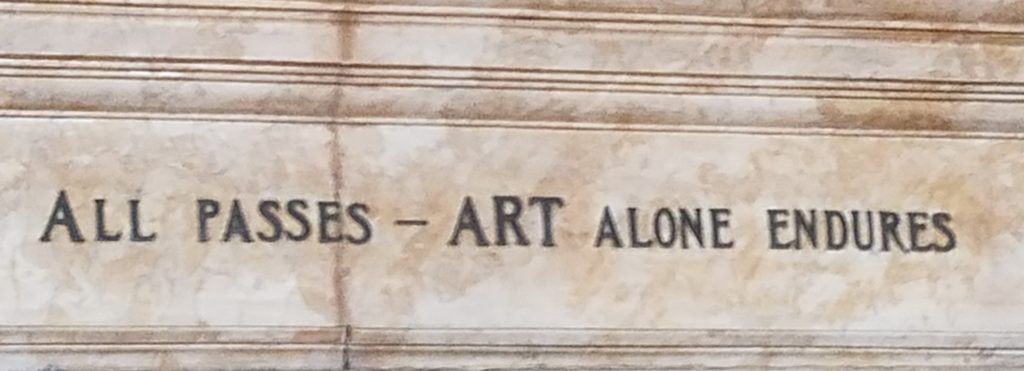“There is a harmony in autumn, and a luster in its sky, which through the summer is not heard or seen, as if it could not be, as if it had not been!” Percy Bysshe Shelley
During the month of September, Choral Potpourri/Choral Ethics will be reviewing what Choral Ethics is and its relevance to our profession, now more than ever. During the tough times we are going through with the COVID-19 Pandemic, self-reflection seems like a good idea. Today we speak of professionalism.
I believe professionalism begins with kindness and in order to be kind, we must have been shown kindness. It starts almost immediately in music lessons with our first teachers. Whether they see talent or something undefinable but promising or nothing but some interest, they are kind and encouraging.
The best teachers are tough but kind. They critique your technique or interpretation but never you as a person. They may, in fact, believe you have no talent or business hoping for a career in music but they will not be the ones to tell you so, unless asked. They will be the first to praise other aspects of your personality and suggest other things you may do in life.
Those who cry “he or she isn’t tough enough to survive in this business” never show a smidge of kindness so as to not appear “weak,” however, the strongest amongst us are the most kind. You can be tough, uncompromising, and not be willing to settle and still be kind. Kindness lessens stress. When folks are less stressed and more relaxed, they are able to learn more quickly, more easily and will perform better.
It is the lack of kindness, the obvious disparaging remark and the mean-spirited criticism that makes a world of difference in our students’ and ensembles’ perception of us as directors and as people. My Mom would call it “being ugly.” Your own Mom may have called it “snotty” or just plain “nasty.” Must we refer to our soprano section as “cackling hens” or say the basses sound like “bottom feeders” or tell the tenors to “loosen their neckties because they sound like they are strangling” or ignore the altos, occasionally call them “Joanie-One-Notes?” Do we need to call our accompanist “Fumble Fingers?” As soon as those “cheap shots” come out of our mouths, our singers and accompanists begin to lose respect for us. We should be honest but not nasty!
What does it take–a few minutes–to NOT make a nasty comment or to make a person feel welcome and appreciated? What’s in it for you? Not sniping is such a small thing in the grand scheme of things. It shows you have a degree of self-control. Being petty with someone you don’t like–or think you don’t like–may be hard at first but the rewards you will reap will be worth it. Rise above and do yourself proud. Be kind to those around you every day. And get the reputation of being someone whom anyone would want to work with and be with and live with.
I was privileged to study at the Chicago Musical College, now the Chicago College of Performing Arts, as an undergraduate and a graduate student. Looking back, I know I was lucky to not only study with some world class and wonderful musicians, but wonderful people. Nurturing and kind and willing to teach, these folks touched not only me but many of my generation of musicians.
In lessons, we were actually taught how to practice. An 18 or 19-year-old comes to music school with no idea how to budget practice or what to practice but we were guided. We were not expected to know everything or be perfect all the time because we were students and it was understood we were to be guided. What we were expected was to be kind, respectful and responsible.
What does it mean exactly, to be kind, respectful and responsible? It is so easy to forget we need to work with others. Unless you are a soloist all the time, you must work with conductors and other musicians on a regular basis. And unless you conduct exactly the kind of ensemble you wish, with the musicians you wish, you must work with whom you are given.
I’ve said this many times before but it bears repeating: many people, even those who are the supposed “professionals,” think it is the drama, making a scene and the last minute changes and the lack of schedules because their ensemble should be the only important thing in your life that makes you a “professional.” I believe it to be the opposite. True professionals respect other’s time and their own as well. It is not only sharing rehearsal schedules that makes them professional, but it shows they are organized and thinking ahead. We all have occasion to have to do things at the last minute but when it is always that way or appears to be that way, it is rather unsettling. And makes me wonder if they are as professional as they claim to be.
Next week, I’ll be blogging about what I’ve learned from writing about Choral Ethics. Until then, we well and be safe.
I am taking my Choral Ethics Blogs to my chamber choir’s Facebook page for the foreseeable future. Please join me there this morning!



Leave a Reply
You must be logged in to post a comment.